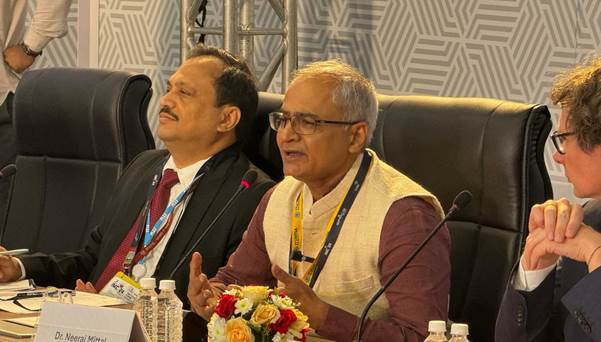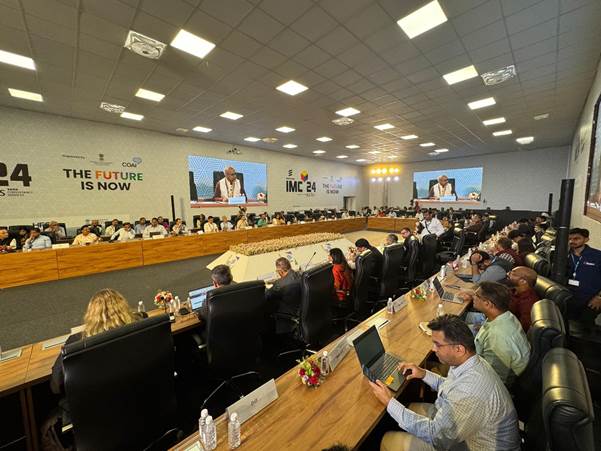Ministry of Communications
ITU-UNCCD-UNDRR Workshop Explores Role of Standardization and Emerging Technologies in Disaster Risk Reduction
Telecom is a horizontal technology on which all other technologies are highly dependent: Secretary (Telecom)
The workshop called for deeper cross-sector collaboration to harness the power of emerging technologies and standardized approaches to tackle critical disaster-related challenges
Posted On:
18 OCT 2024 3:31PM by PIB Delhi
The ITU/UNCCD/UNDRR Workshop themed “Reimagining Disaster Risk Reduction: The Role of Standardization and Innovative Technologies,” was hosted at the Indian Mobile Congress and was collocated with the World Telecommunication Standardization Assembly (WTSA-2024) in New Delhi on 17 October 2024. This Workshop was organized by the International Telecommunication Union (ITU), together with United Nations Convention to Combat Desertification (UNCCD), United Nations Office for Disaster Risk Reduction and Coalition for Disaster Resilient Infrastructure (CDRI) and hosted by the Department of Telecommunications, India (DoT).
This Workshop brought together key experts from various fields to explore how advanced technologies can enhance disaster management. Through the dialogue during the workshop, the need for deeper cross-sector collaboration was called for to harness the power of emerging technologies and standardized approaches to tackle critical disaster-related challenges.
The Workshop featured opening remarks from Dr. Neeraj Mittal, Secretary, Department of Telecommunications who said, “Today technology is converging so rapidly in terms of its capabilities, platforms and devices, that the day is not far away when maybe a single technology can do everything, that is trend I can see going forward.” On the subject of disaster mitigation, he mentioned “telecom is a horizontal technology on which all other technologies are highly dependent and therefore this is the right moment to sit down and discuss all these issues”. He further emphasized that India has made significant strides in developing early warning systems, such as cell broadcast technology, which has played a crucial role in preventing numerous disasters. Notably, this technology was developed by C-DOT, making it only the second vendor in the world to achieve such a milestone. He concluded his address by encouraging the use of all the available technologies to reduce the risk posed by disasters to humanity.


The workshop focused on showcasing the transformative potential of emerging technologies such as artificial intelligence (AI), Internet of Things (IoT) big data, digital twins, drones, remote sensing, and blockchain in mitigating the impact of disasters. Participants discussed how these technologies can improve prediction accuracy, optimize response times, and streamline recovery efforts. Central to the discussions was the role of standardization in integrating these innovations to enhance global resilience against disasters.
Tomas Lamanauskas, Deputy Secretary-General, ITU remarked “Disasters are unfortunately increasing in both frequency and intensity. Both traditional & advanced/emerging technologies like Satellites, AI can surely help but they are also vulnerable. ITU as an organisation has a lot of activities in this regard. It is monitoring from space as well as providing for an emergency telecommunications cluster to make sure communications are working when the natural calamities hit us.”
Mr. Lamanauskas also underscored the pivotal work of the ITU/WMO/UNEP Focus Group on AI for Natural Disaster Management (FG-AI4NDM), which was at the forefront of harnessing modern technologies to address disaster challenges. He also drew attention to the launch of the Global Initiative on Resilience to Natural Hazards through AI Solutions, supported by ITU, the World Meteorological Organization (WMO), United Nations Environment Programme (UNEP), United Nations Framework Convention on Climate Change (UNFCCC), and Universal Postal Union (UPU), which is geared towards leveraging emerging technologies for driving disaster management for a wide range of hazards.
ITU’s efforts in this field are aligned with the "Early Warning for All", which seeks to ensure that every person is protected by early warning systems by the end of 2027.
The workshop concluded with a call for deeper cross-sector collaboration to harness the power of emerging technologies and standardized approaches. By fostering cooperation between industries, governments, and international organizations, standards developing organizations (SDOs), participants emphasized the importance of ensuring that communities worldwide are better prepared and more resilient to natural disasters.
The ITU-UNCCD-UNDRR workshop drew a broad range of key stakeholders, including policymakers, AI specialists, disaster management experts, and representatives from global organizations, private sector entities, NGOs, academia – all of whom committed to advancing the use of technology and standardization in building disaster resilience.
For further details, visit the official event page at https://www.itu.int/wtsa/2024/related-events
******
SB/DP/ARJ
(Release ID: 2066063)
Visitor Counter : 1063